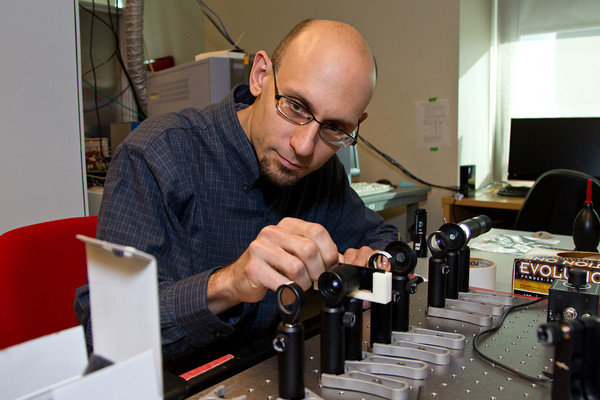Campus Technology Centers Receive $2 Million
Chancellor’s Funding Supports Projects That Enable Cutting-Edge Research

Kurt Thorn, PhD, director of the Nikon Imaging Center, prepares individual lenses that align to create one microscope. His proposal, for a second spinning dish confocal microscope at the imaging center, was one of 10 projects that won a total of $2 million from the Chancellor’s office to expand and improve access to transformative research technologies across campus.
Ten core facilities on campus have been selected to receive a collective $2 million in funds from the Chancellor’s office to expand and improve access to transformative research technologies across UCSF.
2012 Winning Proposals For Transformative Science Grants
- LC-LTQ FT Mass Spectrometry for membrane protein studies
Robert Stroud, PI - Enhanced Protein-Interaction Evaluation, Core Biosensor Lab
Robert Fletterick, PI - Real-time measurement of cell- and tissue-metabolism, Mouse Metabolism Core
Allison Xu, PI - System for Mass Spectrometry-Based Profiling of Post-Translational Modifying Enzymes, Mass Spectrometry Facility
Charles Craik, PI - Computational Infrastructure for Advanced CryoEM Data collection and Processing, Structural and Cellular EM Facility
Yifan Cheng, PI - Next-Generation DNA Sequencers for Genomic Medicine, Genomics Core
Pui-Yan Kwok, PI - NMR probe for structural studies of biological solids, Nuclear Magnetic Resonance Lab
John Gross, PI - HPLC Instrumentation for small molecule discovery, Small Molecule Discovery Center
Adam Renslo, PI - High Speed, Wide Field of View Spinning Disk Confocal, Nikon Imaging Center
Kurt Thorn, PI - High-Content Analysis System to Enable High Throughput Screening and Detailed Analysis, Small Molecule Discovery Center
Michelle Arkin, PI
The facilities, which range from a new mass spectrometer to study membrane protein to a core facility for cell metabolism research, were among 35 proposals submitted to the Enabling Technologies Advisory Committee last fall.
The new centers are intended to transform current access to world-class research technologies for many laboratories and ultimately to help UCSF remain a leader in both basic and translational science.
“Our goal in this chancellor’s program is to support core facilities that truly enable us to transform science, and to do so collaboratively and efficiently,” said Executive Vice Chancellor and Provost Jeff Bluestone, PhD, who launched the award program last year. “The proposals that rose to the top reflect bold efforts on campus to conduct the most advanced science in the world and to maximize our investment to support researchers anywhere on campus.”
Winners were selected by a committee that spanned UCSF schools and areas of expertise. The projects were chosen based on their uniqueness and ability to meet the needs of a large user base in the UCSF community, the ability to leverage the funding to raise additional funds, sustainability over the next five years, and past record of success in providing shared resources.
The funding is intended to enable the centers to create the infrastructure needed for a sustainable business model, so they can support both research and their own upgrades into the future, according to Julie Auger, executive director of the Research Resources Program, who was recruited to UCSF in 2010 to oversee coordination of those resources.
The award program was among the first three on campus to use the open-proposal program developed and managed by the UCSF Clinical and Translational Science Institute (CTSI), which enables other faculty to offer insights on the proposals before submission to improve the original proposal, promote collaborative work and reduce the likelihood of redundancies. Together, the 10 winning proposals garnered 38 comments.
For more information on the 10 recipient centers, go to http://open-proposals.ucsf.edu/etac.
Photo by Susan Merrell
Related Story:
UCSF Invests in Technologies for Core Research Facilities
Enabling Technologies Advisory Committee
Proposals were selected by a group of eight UCSF experts with a range of research backgrounds and expertise, including structural biology, clinical research support and computational biology. The group also provides ongoing strategic guidance on campus technology investments.
Chair: Jim Wells, PhD, Pharmaceutical Chemistry
Ex Officio: Julie Auger, PhD, Office of the EVCP
Committee:
Max Krummel, PhD, Pathology
Jonathan Weissman, PhD, Cellular & Molecular Pharmacology
Laura van't Veer, PhD, Laboratory Medicine
Joe DeRisi, PhD, Biochemistry
Sharmila Majumdar, PhD, Radiology
Andrej Sali, Bioengineering & Therapeutic Sciences
Bruce Conklin, MD, Gladstone Institutes, Cardiovasculature Disease